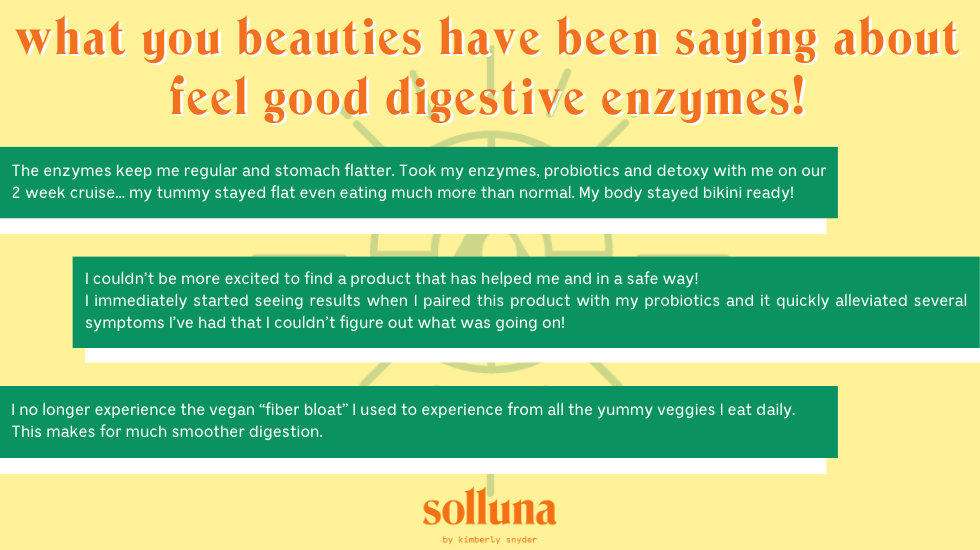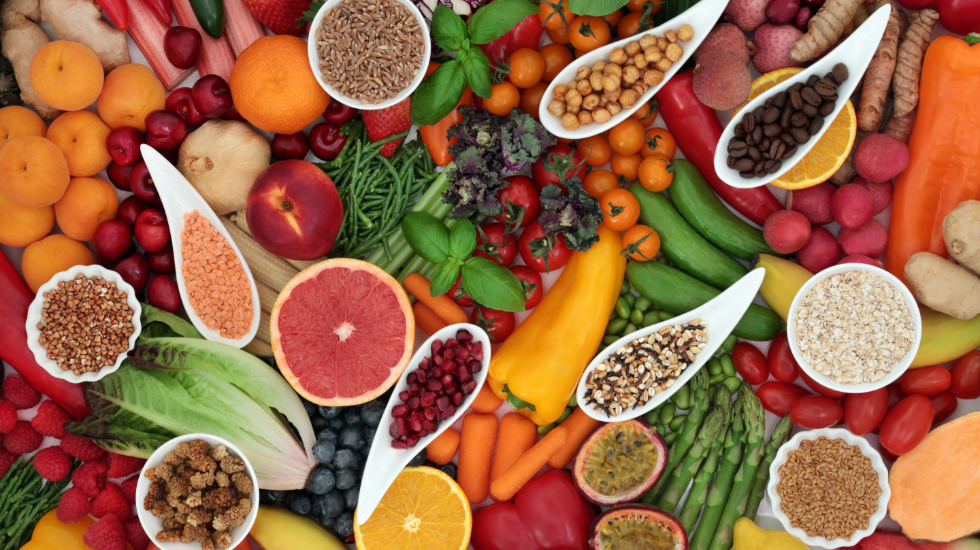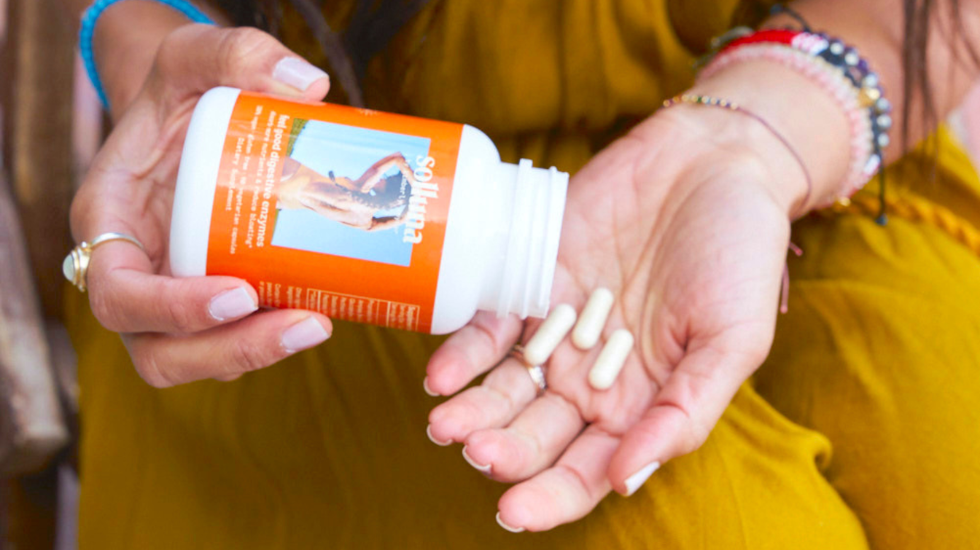
Do you find yourself wondering how long it takes for digestive enzymes to work? You’re not alone! Many people add digestive enzyme supplements to their routine but aren’t sure when they’ll start seeing results for bloating and discomfort.
The good news is that with the right diet and consistent use of supplements, you can get your digestion back on track and feel like a brand-new you!
In this article, I’ll show you how your digestive enzymes might be the answer to your bloated woes and when you can expect them to restore balance to your digestive system and reclaim your body’s natural rhythm!
How Digestion Causes Bloating
When you digest your food, intestinal gas is produced. Some gas is naturally produced during digestion (typically when you digest carbohydrates), but too much can mean that something is amiss. Too much of this gas causes bloating and even a distended stomach. Bloating during digestion can be caused by eating too much too quickly, or that you’re swallowing air while you eat. (If that’s the case, slow down! Chewing your food thoroughly is so important.)
Bloating can be a result of a digestive issue, too, such as:
- Small intestinal bacterial overgrowth (SIBO), a disorder where bacteria from your colon arrive in your small intestine.
- Digestive disorders like irritable bowel syndrome (IBS) and functional dyspepsia, or chronic indigestion.
- Intolerance to certain foods, such as dairy (lactose intolerance) or grains like wheat and barley (Celiac disease).
Many digestive issues are caused by deficiencies in certain digestive enzymes that your body naturally creates. For example, lactose intolerance is caused when your body doesn’t produce enough lactase, an enzyme that breaks down the lactose in dairy products.
Another digestive enzyme deficiency that causes bloating, gas, and discomfort is exocrine pancreatic insufficiency (EPI), where your pancreas doesn’t produce enough of the pancreatic enzymes that are vital to healthy digestion, such as those that digest carbs, protein, or fats.
Even if you don’t have any insufficiencies, there are still days when your digestion may not be at its best. It happens to all of us— but don’t worry; the right digestive enzyme supplement can help get your gut back on track! 🙂

How Digestive Enzyme Supplements Help Your Body
I’ve already written an article all about the role digestive enzymes play in your body. If you want to learn more, I recommend checking out that article once you’re done here! I’ll give you a quick rundown here:
Your pancreas typically produces the digestive enzymes your body needs, and there are also enzymes found in your saliva. These enzymes play a crucial role in breaking down the food you eat, allowing your body to fully absorb its nutrients. However, on days when your digestion isn’t functioning at its best, your body may not be able to extract all the vital nutrients from the food you eat.
This is where a digestive enzyme supplement comes in.
These supplements don‘t boost enzyme production, but supplement the enzymes your body already produces to maximize their utility. Some of these supplements even include enzymes that your body doesn’t produce on its own but are nonetheless vital to healthy digestion. One of these enzymes is alpha-galactosidase, which breaks down a healthy fiber found in beans and root vegetables that can cause bloating and gas.
You might be thinking, “this sounds a lot like probiotics.” They have their similarities, but they’re not exactly the same.
Probiotics are beneficial gut bacteria that promote healthy digestion and better overall health. They help keep your gut healthy, but they don’t help you digest your food! To learn more about those, check out my article about probiotics vs. prebiotics vs. postbiotics!
Now let’s talk about why you’re here. 🙂

How Long Does it Take to See Results with a Digestive Enzyme Supplement?
The short answer is that it depends. Some of you Beauties that take my Feel Good Digestive Enzymes supplement reported immediate results and fast relief to their bloating and digestive woes.
You should start seeing results shortly after you start taking the supplement, but the biggest factor that affects how quickly and how well a digestive enzyme supplement works is your diet.
A healthy diet rich in wholesome plant foods is vital for healthy digestion, especially if you’re taking a digestive enzyme supplement. Feeding your body a rainbow of nutrient-rich foods is like giving it a warm hug from the inside out!
On top of better digestion, digestive enzymes paired with a healthy diet can bring you exciting results like fat loss, more energy, and you can say bye-bye to bloating!
The right diet provides your body with the nutrients it needs to be at its healthiest. On the other hand, an unhealthy diet can deprive your body of those vital nutrients, introduce toxins into your body, and hinder your digestion, which can prevent you from getting the most out of your digestive enzymes.
You won’t get the most out of your digestive enzymes without supplying your body with the nutritious food it needs to be healthy.
You need a healthy diet to have the best digestion, and you need healthy digestion to get the most out of your healthy diet. By nourishing your body with wholesome plant-based foods, you’ll be able to maximize the benefits of your digestive enzyme supplement and enjoy better overall health and wellness!
If you’re still on the fence about taking a digestive enzyme supplement, check out my article about the 4 untold benefits of digestive enzymes.

How to Maintain Your Good Results
So now you’re taking a digestive enzyme supplement, and you’re starting to see results! Excellent! Here’s how to keep that momentum going. 🙂
1. Stick to it!
The best way to keep that momentum going is to keep at it! If you’re starting to see good results now, just imagine how great it’ll be if you keep going.
It may not be super comfortable to start, especially if your digestion has been sluggish for a while. Be patient and keep taking your enzymes, and you’ll feel much lighter and cleaner in no time.
2. Continue with Your Healthy Diet
Remember what I told you earlier: a healthy diet is vital to good digestion, and you need a healthy diet to get the most out of your digestive enzymes. Don’t just rely on the digestive enzyme supplement to do all the work for you. Instead, continue to make conscious choices about what you eat, how much you eat, and how you prepare your food.
Eating raw and organic foods will help boost your digestion further because, unlike processed foods, they are enzymatically alive. This means they contain live enzymes that help you digest that food, so your body needs to use less of its own enzymes for digestion.
Some foods naturally contain digestive enzymes too, so make sure to include these in your healthy diet! [1]
- Pineapple. Pineapple contains bromelain, which helps you digest and absorb proteins and convert them into amino acids.
- Bananas. Bananas may be the perfect food because they’re rich in potassium, fiber, and so many more key nutrients. Bananas also naturally contain amylases as well as glucosidases, which break complex carbohydrates down into sugars.
- Mango. Like bananas, mangoes contain amylases. Amylase is also made by your pancreas and salivary glands too.
- Fermented foods. Fermented foods like kimchi and sauerkraut naturally contain digestive enzymes as well as probiotics. These probiotics produce amylase as well as lipase and protease, which help break down fat and protein.
- Ginger. Ginger has been used medicinally and in many world cuisines for millennia, and for good reason. It can help relieve nausea, it’s packed with antioxidants, and it contains natural digestive enzymes, particularly a protease called zingibain. Ginger can also help food move faster through your body by helping your stomach contract. That might sound unpleasant, but that’s a good thing! 🙂 [2]
3. Take a Probiotic Supplement
Like digestive enzymes, probiotics are vital to healthy digestion and better gut health.
To really give your digestion that extra oomph, I recommend taking a probiotic supplement to complement your digestive enzymes and wholesome diet.
Remember, probiotics don’t help your body digest food like the enzymes will. Rather, they’ll supplement the good bacteria in your gut that promote healthier digestion and better overall health.
Not sure how to choose the best probiotic supplement for your gut health? Check out my suggestions!

Does Poor Digestion Have Your Stomach in Knots?
Your digestive tract is an intricate system full of many individual components that rely on each other to function normally. But when something is amiss in your digestive system, you’ll quickly start to feel it.
So if something doesn’t feel right in your body, then listen to that cue. If you keep at taking your digestive enzyme supplement, probiotics, and eating a wholesome diet, then hopefully, your body won’t have much to say other than “thank you!” 😉
A healthy whole food-based diet and taking good digestive enzyme and probiotic supplements are key to healthy digestion. You should see results shortly after you start taking a supplement, but what you really want are continuous results rather than a quick fix. This means keeping at your healthy diet and taking your supplement to help keep your digestion robust, even on days when you may be feeling sluggish and tired.
It happens to us all. ❤
In good health,

Citations
- Raman, Ryan. “12 Foods That Contain Natural Digestive Enzymes.” Healthline, Healthline Media, 20 Mar. 2023, www.healthline.com/nutrition/natural-digestive-enzymes.
- Bodagh, Mehrnaz Nikkhah, et al. “Ginger in Gastrointestinal Disorders: A Systematic Review of Clinical Trials.” U.S. National Library of Medicine, Food Science & Nutrition, 5 Nov. 2018, www.ncbi.nlm.nih.gov/pmc/articles/PMC6341159/.
The post Digestive Enzymes and Bloating: Can They Help and How Long Does It Take to See Results? appeared first on Solluna by Kimberly Snyder.
No comments:
Post a Comment